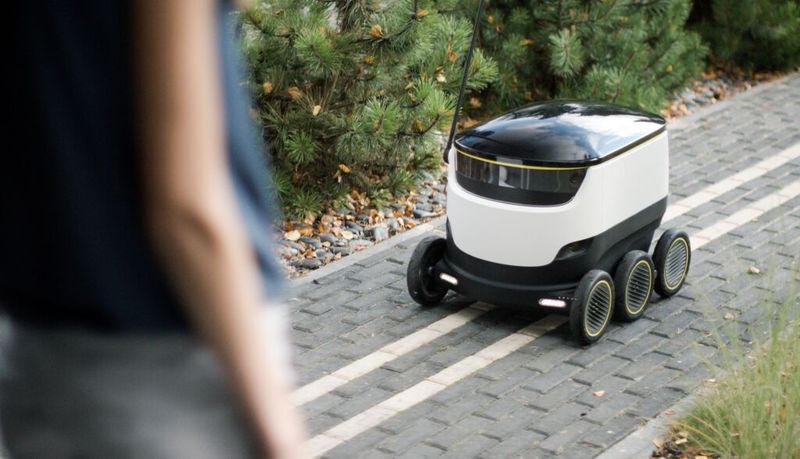In the near future, some Americans will be able to have food and other goods delivered to them not by drone, but by a semi-autonomous robot. Starship Technologies just announced the first of two commercial partnerships for its ground-based delivery robots in the U.S. — one with DoorDash in Redwood City, CA, and one with Postmates in Washington, D.C. The trials will see these services start making deliveries in the coming weeks using Starship’s six-wheeled robots within a four-mile-wide test area in each city.
The DoorDash trial is planned to take place in Redwood City’s downtown business district, and Starship will run its Postmates pilot in the northwestern part of Washington, D.C.’s city limits. Customers of both companies will see the robots pop up as a delivery option in their respective apps, and it won’t cost any more than a typical delivery.

Delivery! Image source: Starship Technologies.
While these robots will be Starship’s first two commercial trials in the U.S., the robots have already driven thousands of miles in cities around the world, and the company even helped get legislation put in place to make the testing possible in Washington, D.C. Starship has performed deliveries in the U.K. and Germany, thanks to partnerships with services such as Just Eat, Pronto, and Hermes.
Once an order is placed along with a selected delivery method, customers will receive a notification when their delivery is on its way. Impressively, the robots can carry up to 20 pounds of cargo, and their top speed is 4 MPH, meaning that they stick to navigating sidewalks. With the option to track deliveries on a map, customers will also receive a notification when packages arrive.
For security reasons, customers will be texted a custom link that they have to tap in order to unlock and open the robot’s hatch. Other safety measures include cameras, GPS, built-in alarms, and a two-way radio on each robot.
As long as the company already mapped out the delivery area, Starship robots can navigate autonomously with the help of cameras and sensors. While the company has been mapping its chosen cities for months now, they have yet to cover every street and sidewalk. The commercial trials will employ a mix of semi-autonomy and human control, with Starship employees remotely piloting the robots when needed.
Luckily, the more that the robots are used, the more that Starship will be able to map the delivery areas that it has yet to conquer. According to the company, its goal is to have thousands of delivery bots operating at 99% autonomy with minimal human oversight.
So far, Starship has built 70 robots for its tests around the globe.
Source: The Verge
Advertisement
Learn more about Electronic Products Magazine





